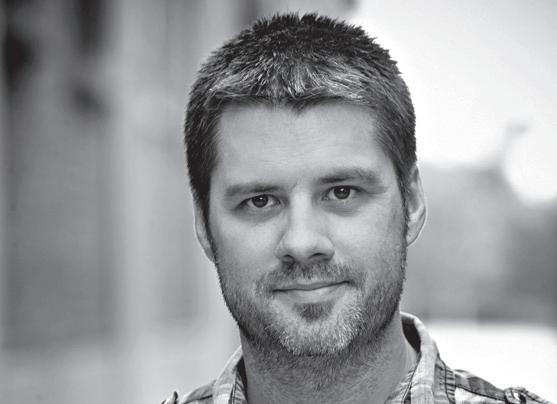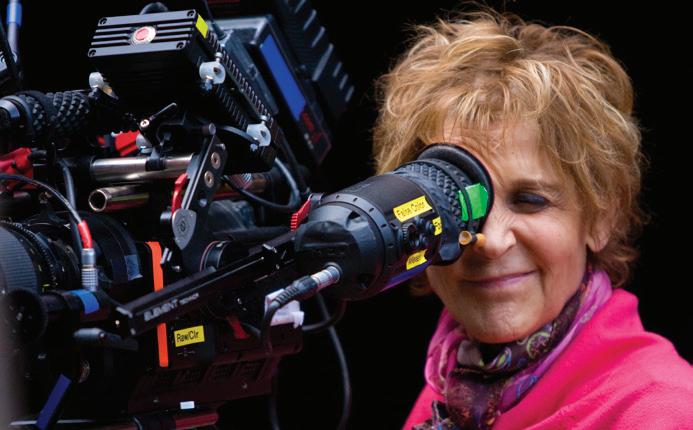
4 minute read
Life As An Independent Cinematographer: An Interview with Nancy Schrieber, ASC
LIFE AS AN INDEPENDENT CINEMATOGRAPHER AN INTERVIEW WITH NANCY SCHREIBER, ASC By Bobby Marko

Advertisement

I had the pleasure of speaking with Nancy Schreiber, ASC, who will be featured at today’s event. Nancy has a huge list of work throughout her career ranging in short films, documentaries, TV and feature films.
You started off as an electrician and gaffer, but was it always your goal to become a cinematographer?
Well I think I really just fell into it. I actually have a degree in Psychology from the University of Michigan. Everyone laughs at my degree, but it has become useful with all the personalities out there! When I graduated, I decided not to pursue graduate school. I’m a very active person and I wouldn’t like sitting on my butt as a therapist. I really enjoy the physicality of shooting and even before that, lighting. So I followed my boyfriend at the time to New York and I answered an ad in the Village Voice to get onto a movie set. In the beginning they were sending me all over the city to get props, costumes and such. But they were so under staffed that I ended up in the lighting department. I didn’t have any experience with lighting, but I did have an art background. I had a gaffer that taught me and was very open [about sharing his knowledge], I took to it so quickly and just loved it!
I have a mentor named Mark Obenhaus who is a documentary director and filmmaker. I was on a commercial shoot with him and I was able to do the lighting. Mark came to me after viewing one of the dailies (of which I was not invited for) and told me I should just start actually shooting. So I did and worked my way up. Shooting little things, donating my time and shooting student films.
How important was that experience moving up through the ranks? I ask because in some ways I see this sort of career progression disappearing, since so many young professionals can get a camera and start creating their own content, rather than having to gain the experience before they’re allowed to touch a camera.
That’s an interesting question to think about once you have done it. Certainly things have changed. It was at the time more of a New York thing to come from gaffing and then on to camera and DP. The Hollywood structure was to go from 1st AC to camera operator and finally to DP. For me I really liked moving my way up. I really like set etiquette regarding how to deal with producers, directors, and actors. For that reason I think it was a good training ground. I’m happy that I came up through the ranks because it worked for me, but some people don’t need to. It’s such an individual thing.
You’re based in New York and Los Angeles, so what can you tell us about the differences between the two markets in terms of the work you pursue and book?
Really there’s very little difference today between NY and LA other than [for me] there’s more work in NY. We haven’t had tax incentives in California until recently. Ultimately most projects originate out of NY and LA, so it’s not a bad thing to have some sort of presence in both areas. In LA people used to not like the fact that I was coming in from NY, but now people don’t really know exactly where I live. Now I have a lot of interviews by Skype or FaceTime from wherever I am.
Glancing through your IMBD page, you’ve worked on just about every different kind of project that’s out there. Is there a particular type of project that you gravitate toward?
I love shooting period films. One of my favorite projects was a turn of the century film set in China. Having said that, there’s nothing like stories about real life through documentaries. I think they fuel my fiction work by making me notice human nature and certainly shooting with natural light. This has come into play because I have shot nonfiction feature films where it’s mostly natural light or handheld.
What’s been your biggest challenge as a working cinematographer?
I would say the biggest challenge today working a lot in independent cinema, is people getting their financing. The budgets are so small and my biggest challenge is finding ways to do the work without compromising my skill or my eye in the time allotted.
I’ve been able to shoot two different movies in 15 days each. One of them, It’s a Disaster; was pretty much set in one house with an ensemble cast. But that’s not the norm. So the challenge is getting enough days to shoot properly, getting the budget for the proper gear, and asking crew to work for a cheaper rate.

What’s the best advice you’ve been given throughout your career that has stuck with you?
I would say the best advice I’ve been given is don’t give up. There is going to be rejection. You’re not always going to get the jobs you always want. But if you want it you’re going to keep going, no matter how much rejection you get.
Also, find a way to have a life outside of film. I like to travel, I like to visit art and photography exhibits, I like to garden. I like to go and see theater shows and also donate my time to causes, I have a well-rounded life. I can’t think of anything else I’d rather be doing. I’ve said this before but I hope to drop dead on set when I’m 100!

Bobby Marko (@MarkoVisual), is an award winning filmmaker based in Nashville, TN. A retired professional musician turned filmmaker, Bobby has covered the world of film and video, from live production and chroma key capture to short films and feature length documentaries. He’s had published articles at Cannes Film Festival and has been a featured presenter at IBC in Amsterdam. Bobby’s passion is to capture the heart of a story through moving imagery and share his experience along the way. You can catch his podcast show on iTunes and Soundcloud, the Authentic Filmmaking Podcast.



